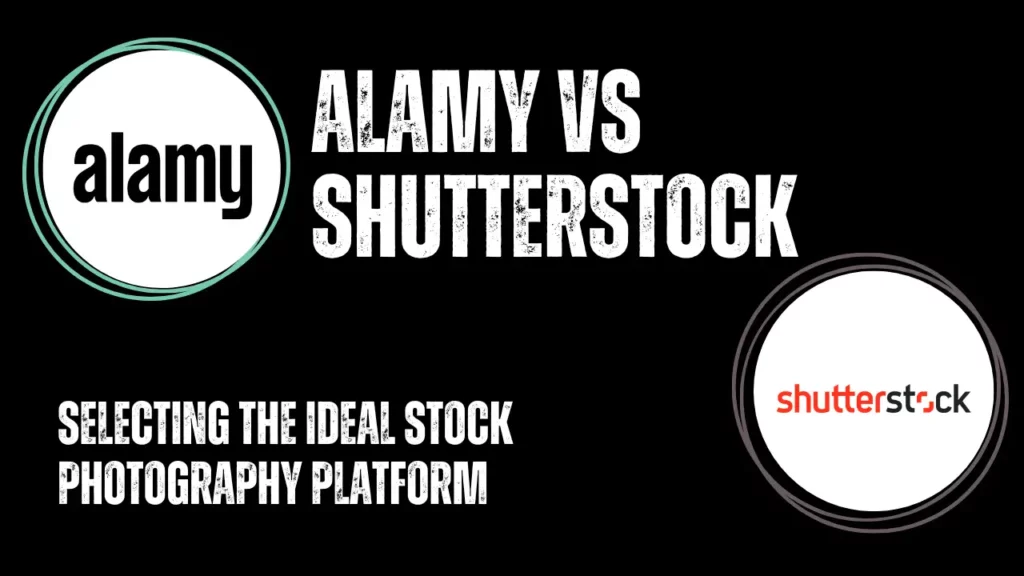Introduction
Selecting the right stock photography platform is essential for photographers, designers, and creative professionals looking to buy or sell high-quality images. Among the numerous options available, Alamy and Shutterstock stand out as leading platforms in the industry. This comparison aims to help individuals make an informed decision by analyzing their key features, offerings, and differences.
Alamy has gained recognition as a prominent stock photography platform since its establishment. With a vast collection of images contributed by photographers from around the world, Alamy offers a diverse range of content to meet the needs of various industries and creative projects. Its commitment to quality and accessibility has made it a popular choice among buyers and contributors alike.
Also Read This: Most Eliminations in Royal Rumble History
Platform Overview
[caption id="attachment_200819" align="alignnone" width="1500"] Platform Overview[/caption]
Platform Overview[/caption]
Alamy and Shutterstock are two prominent stock photography platforms that offer extensive collections of high-quality images, videos, illustrations, and music. Understanding the background, scope, and key features of each platform is essential for individuals looking to buy or sell images.
Alamy, founded in 1999, has grown into one of the largest and most diverse stock photography platforms. It boasts a vast collection of images contributed by a global network of photographers and content creators. Alamy's library covers a wide range of subjects, styles, and genres, catering to various industries and creative needs. With its commitment to accessibility, Alamy provides an opportunity for contributors to showcase their work to a broad customer base.
Shutterstock, established in 2003, has become a leading platform in the industry. It offers a comprehensive selection of images, videos, illustrations, and music to support the creative projects of individuals and businesses. Shutterstock's library is vast and continuously expanding, with millions of assets available for licensing. Its user-friendly interface and powerful search capabilities make it easy for buyers to find the content they need quickly and efficiently.
Both platforms have extensive contributor bases, with photographers and content creators from around the world contributing to their collections. This diverse contributor network ensures a continuous influx of fresh and unique content, providing buyers with a wide variety of options.
Alamy and Shutterstock offer licensing options that cater to different usage requirements. They provide licenses for commercial, editorial, and personal use, allowing buyers to find the appropriate licensing options for their specific needs. Pricing structures and royalty rates may differ between the platforms, impacting the earning potential for contributors.
The image selection and quality control processes on both platforms are designed to ensure high standards and a reliable selection for buyers. Contributors undergo a review process where their submissions are assessed for technical quality, composition, and adherence to platform guidelines. This quality control process helps maintain the integrity and consistency of the collections.
Also Read This: Guide to Deleting Adobe Stock Licenses and Revoking Access to Purchased Assets
Licensing and Usage Options
Licensing options play a significant role in determining how images can be used and the rights granted to buyers. Both Alamy and Shutterstock offer a range of licensing options to accommodate various usage requirements.
Alamy provides a comprehensive selection of licensing options to cater to different needs. They offer both commercial and editorial licenses. Commercial licenses are suitable for marketing, advertising, and promotional purposes, while editorial licenses are designed for news, journalistic, or educational use. Alamy also offers additional licensing options, such as exclusive and extended licenses, which provide buyers with more extensive usage rights and exclusivity.
Shutterstock offers flexible licensing options to meet the diverse needs of buyers. They provide Standard licenses and Enhanced licenses. Standard licenses grant buyers the right to use images for commercial and personal projects, while Enhanced licenses offer additional rights, such as unlimited reproductions and usage in merchandise for resale.
Both platforms have royalty-free licensing models, which allow buyers to use the licensed content multiple times without incurring additional fees for each use. This provides flexibility and cost-effectiveness for buyers seeking to use images in various projects.
It is important for photographers and contributors to consider the licensing options available on each platform when submitting their work. By understanding the licensing models and guidelines, contributors can align their submissions with the intended usage rights and maximize the potential for sales.
Pricing structures and royalty rates may vary between Alamy and Shutterstock. Contributors should familiarize themselves with the commission rates and payment models of each platform to gain a clear understanding of their potential earnings.
This video explains about Alamy vs Shutterstock:
Also Read This: Streaming Dailymotion Content on Roku Devices
Image Selection and Quality Control
The image selection process and quality control measures are crucial aspects of stock photography platforms like Alamy and Shutterstock. These processes ensure that the collections maintain high standards and provide buyers with a reliable selection of high-quality images.
Alamy employs a thorough image selection process to curate its collection. When contributors upload images, they undergo a review by Alamy's quality control team. This team evaluates the technical quality, composition, and adherence to Alamy's guidelines. The review process aims to maintain the overall quality and consistency of the collection, ensuring that only the best images are available to buyers.
Similarly, Shutterstock maintains rigorous quality control measures to ensure the quality and relevance of its image library. The platform's team of editors carefully reviews and selects images based on strict criteria. They assess technical aspects such as resolution, focus, and lighting, as well as the overall composition and market relevance of the images. This meticulous selection process ensures that the collection maintains a high standard of quality.
Both platforms provide guidelines and resources to assist contributors in understanding the technical and content requirements for image submissions. It is essential for photographers to review these guidelines and adhere to them when preparing and submitting their images. By following these guidelines, contributors can increase their chances of having their images accepted and included in the platforms' collections.
Contributors should strive to provide authentic and original content. Avoiding excessive manipulation, adhering to copyright regulations, and providing accurate and relevant metadata are important aspects of maintaining quality and ensuring the credibility of the images.
Also Read This: How to Make Biscuits Without an Oven with This Easy DIY Recipe
Market Reach and Customer Base
[caption id="attachment_200852" align="alignnone" width="1500"] Market Reach and Customer Base[/caption]
Market Reach and Customer Base[/caption]
The market reach and customer base of stock photography platforms like Alamy and Shutterstock are essential factors to consider when choosing a platform. Understanding the audience and reach of each platform helps photographers and contributors target their work effectively and increases the potential for sales and exposure.
Alamy has a global market reach, catering to a diverse customer base that spans across various industries and sectors. Their customer base includes publishers, advertisers, designers, and creative professionals seeking high-quality images for editorial, commercial, and personal use. Alamy's extensive collection covers a wide range of subjects, styles, and genres, attracting buyers from various backgrounds.
Shutterstock also boasts a global market reach and a vast customer base. Their customers include individuals, businesses, marketing agencies, and creative professionals seeking images, videos, illustrations, and music for their projects. Shutterstock's library covers a broad spectrum of topics and styles, catering to different industries and creative needs.
Both platforms attract customers from diverse geographic regions. Alamy's global presence allows contributors to reach buyers from different countries and cultures, increasing the potential for international sales and exposure. Shutterstock's extensive market reach ensures that contributors have the opportunity to reach a wide range of clients and customers from various parts of the world.
Also Read This: Best Practices for Uploading Images Online and Generating URLs
Contributor Experience and Support
[caption id="attachment_200859" align="alignnone" width="1240"] Contributor Experience and Support[/caption]
Contributor Experience and Support[/caption]
The contributor experience and available support are vital considerations when evaluating stock photography platforms like Alamy and Shutterstock. A positive and supportive environment can greatly impact a photographer's journey and success on these platforms.
Alamy provides a user-friendly registration and submission process for contributors. Setting up an account is relatively straightforward, and the platform offers clear guidelines and resources to assist contributors in navigating the submission process effectively. Alamy's interface allows for easy uploading and management of images, ensuring a seamless experience for contributors.
To support photographers and contributors, Alamy offers various resources such as contributor forums and educational materials. These platforms foster community engagement and knowledge sharing among contributors. Additionally, Alamy provides customer support channels to address any queries or concerns that contributors may have throughout their journey.
Shutterstock also prioritizes a positive contributor experience. The platform offers a seamless registration process and provides comprehensive guidelines and resources to assist contributors in understanding the submission requirements and best practices. Shutterstock maintains a robust contributor portal with access to sales reports, performance analytics, and educational materials to help contributors track their progress and optimize their portfolios.
Shutterstock provides multiple support channels, including a dedicated contributor support team, to assist photographers with any questions or issues they may encounter. Additionally, they offer forums and community platforms where contributors can connect, learn from each other, and share their experiences.
The support and resources provided by Alamy and Shutterstock contribute to a nurturing environment for photographers and contributors. By leveraging these resources, contributors can enhance their skills, stay informed about industry trends, and improve their chances of success in the competitive stock photography market.
Also Read This: How to Find Famous YouTubers Near You: Discover Popular Creators in Your Area
FAQ
What is Alamy?
Alamy is a stock photography agency that was founded in 1999. It has over 200 million images in its library, and it is used by a wide range of businesses and individuals.
What is Shutterstock?
Shutterstock is a stock photography agency that was founded in 2003. It has over 350 million images in its library, and it is one of the most popular stock photography websites in the world.
What are the similarities between Alamy and Shutterstock?
Both Alamy and Shutterstock are stock photography agencies that allow photographers to sell their images to a global audience. They both have large libraries of images, and they both offer a variety of licensing options.
What are the differences between Alamy and Shutterstock?
- Alamy's image library is more focused on editorial content. This means that Alamy has a lot of historical, cultural, and scientific images.
- Shutterstock's image library is more focused on commercial content. This means that Shutterstock has a lot of images that are used in advertising and marketing.
- Alamy's pricing is more competitive. Alamy's standard licenses start at $15, while Shutterstock's standard licenses start at $25.
- Shutterstock has a more established brand. Shutterstock is a more well-known brand, which can make it easier to sell images.
Which stock photography platform is right for me?
The best stock photography platform for you will depend on your needs and preferences. If you are looking for editorial content, Alamy is a good option. If you are looking for commercial content, Shutterstock is a good option. If you are looking for a more competitive price, Alamy is a good option. If you are looking for a more established brand, Shutterstock is a good option.
What are some tips for choosing the right stock photography platform?
- Consider your needs and preferences. What type of content are you looking for? What is your budget?
- Do your research. Compare the different stock photography platforms and read reviews.
- Sign up for free trials. Many stock photography platforms offer free trials, so you can try them out before you commit.
- Start small. Don't upload all of your images at once. Start with a small selection and see how they perform.
How do I get started selling images on Alamy or Shutterstock?
To get started selling images on Alamy or Shutterstock, you will need to create an account and upload your images. You will also need to choose the licensing options for your images. Once you have uploaded your images, they will be reviewed by Alamy or Shutterstock. If your images are approved, they will be added to the library and you will start earning money when they are purchased.
What are some tips for selling images on Alamy or Shutterstock?
- Upload high-quality images. The quality of your images is one of the most important factors that will affect your sales.
- Tag your images carefully. The tags that you use will determine how your images are found by buyers.
- Promote your images. Share your images on social media and other online platforms.
- Be patient. It takes time to build a successful stock photography business.
What are the future trends for Alamy and Shutterstock?
The stock photography industry is constantly evolving. As technology advances, new opportunities will emerge for stock photographers.
How can I get help if I have questions about Alamy or Shutterstock?
Both Alamy and Shutterstock offer customer support. You can contact them via email or phone.
Conclusion
When it comes to selecting the ideal stock photography platform, both Alamy and Shutterstock offer unique features and advantages that cater to the needs of photographers, contributors, and buyers. By considering the platform overview, licensing and usage options, image selection and quality control, market reach and customer base, and the contributor experience and support, individuals can make informed decisions based on their specific requirements and goals.
Alamy distinguishes itself with its diverse collection, global reach, and commitment to accessibility. Their wide range of licensing options, including commercial and editorial licenses, provides flexibility for buyers. Alamy's emphasis on quality control ensures a curated selection of high-quality images.
